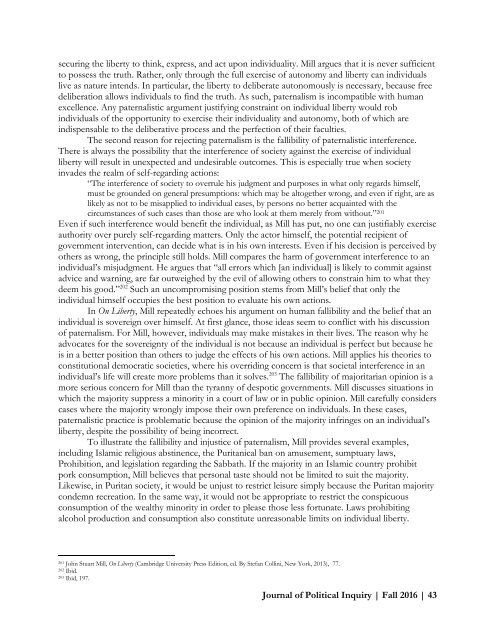Fall2016_Final
You also want an ePaper? Increase the reach of your titles
YUMPU automatically turns print PDFs into web optimized ePapers that Google loves.
securing the liberty to think, express, and act upon individuality. Mill argues that it is never sufficient<br />
to possess the truth. Rather, only through the full exercise of autonomy and liberty can individuals<br />
live as nature intends. In particular, the liberty to deliberate autonomously is necessary, because free<br />
deliberation allows individuals to find the truth. As such, paternalism is incompatible with human<br />
excellence. Any paternalistic argument justifying constraint on individual liberty would rob<br />
individuals of the opportunity to exercise their individuality and autonomy, both of which are<br />
indispensable to the deliberative process and the perfection of their faculties.<br />
The second reason for rejecting paternalism is the fallibility of paternalistic interference.<br />
There is always the possibility that the interference of society against the exercise of individual<br />
liberty will result in unexpected and undesirable outcomes. This is especially true when society<br />
invades the realm of self-regarding actions:<br />
“The interference of society to overrule his judgment and purposes in what only regards himself,<br />
must be grounded on general presumptions: which may be altogether wrong, and even if right, are as<br />
likely as not to be misapplied to individual cases, by persons no better acquainted with the<br />
circumstances of such cases than those are who look at them merely from without.” 201<br />
Even if such interference would benefit the individual, as Mill has put, no one can justifiably exercise<br />
authority over purely self-regarding matters. Only the actor himself, the potential recipient of<br />
government intervention, can decide what is in his own interests. Even if his decision is perceived by<br />
others as wrong, the principle still holds. Mill compares the harm of government interference to an<br />
individual’s misjudgment. He argues that “all errors which [an individual] is likely to commit against<br />
advice and warning, are far outweighed by the evil of allowing others to constrain him to what they<br />
deem his good.” 202 Such an uncompromising position stems from Mill’s belief that only the<br />
individual himself occupies the best position to evaluate his own actions.<br />
In On Liberty, Mill repeatedly echoes his argument on human fallibility and the belief that an<br />
individual is sovereign over himself. At first glance, those ideas seem to conflict with his discussion<br />
of paternalism. For Mill, however, individuals may make mistakes in their lives. The reason why he<br />
advocates for the sovereignty of the individual is not because an individual is perfect but because he<br />
is in a better position than others to judge the effects of his own actions. Mill applies his theories to<br />
constitutional democratic societies, where his overriding concern is that societal interference in an<br />
individual’s life will create more problems than it solves. 203 The fallibility of majoritarian opinion is a<br />
more serious concern for Mill than the tyranny of despotic governments. Mill discusses situations in<br />
which the majority suppress a minority in a court of law or in public opinion. Mill carefully considers<br />
cases where the majority wrongly impose their own preference on individuals. In these cases,<br />
paternalistic practice is problematic because the opinion of the majority infringes on an individual’s<br />
liberty, despite the possibility of being incorrect.<br />
To illustrate the fallibility and injustice of paternalism, Mill provides several examples,<br />
including Islamic religious abstinence, the Puritanical ban on amusement, sumptuary laws,<br />
Prohibition, and legislation regarding the Sabbath. If the majority in an Islamic country prohibit<br />
pork consumption, Mill believes that personal taste should not be limited to suit the majority.<br />
Likewise, in Puritan society, it would be unjust to restrict leisure simply because the Puritan majority<br />
condemn recreation. In the same way, it would not be appropriate to restrict the conspicuous<br />
consumption of the wealthy minority in order to please those less fortunate. Laws prohibiting<br />
alcohol production and consumption also constitute unreasonable limits on individual liberty.<br />
201<br />
John Stuart Mill, On Liberty (Cambridge University Press Edition, ed. By Stefan Collini, New York, 2013), 77.<br />
202<br />
Ibid.<br />
203<br />
Ibid, 197.<br />
Journal of Political Inquiry | Fall 2016 | 43
















